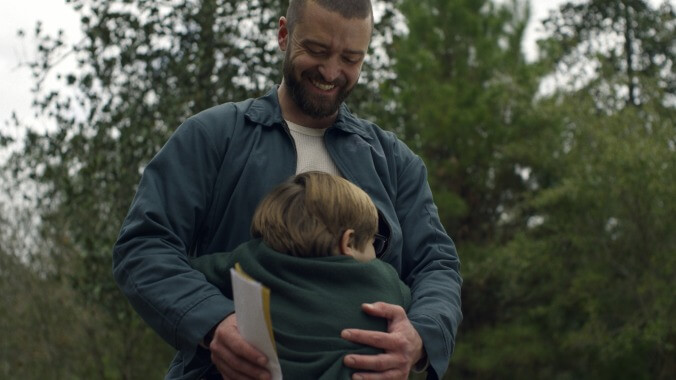Generic redemption drama Palmer expects us to buy Justin Timberlake as a hardened ex-con

If there’s anything worth missing about the leading men of long ago, it is not—as right-wing pundits claim—some masculine ideal embodied by John Wayne’s toupee and sauntering catwalk gait. It’s a kind of believability. There was a time when cirrhotic, prematurely middle-aged stars could be seen stumbling through the motions of a Hollywood plot. These men were exponentially more magnetic and commanding than the average American but still looked like they might have worked as stevedores or boxers before they ever wandered into a theater class. Blame it on Marvelization and the obsession with Men’s Health-cover abs, but at this point our male actors all look like they could only be from Hollywood, even phonier than the generation that had their names picked out for them by the studios.
Perhaps this is unfair to Justin Timberlake, who has barely been in movies since the early 2010s. But the truth is that there aren’t any stars of similar name recognition who might credibly play the title character in Palmer: a former small-town football prospect, once addicted to opioids, who has recently been paroled after 12 years in prison. A decade too old for the role, but without visible wear and tear, he inhabits it through the usual means: smiling minimally, playing everything at an emotional chill, occasionally whining, with the logic that ordinary people suffer from a lack of personality. For a guy who’s spent a long time behind bars, he doesn’t seem to have any rough edges.
As is frequently the case in such feel-good dramas, the job of keeping the audience engaged instead falls on an adorable little boy, Sam (Ryder Allen), whose love of fairy princesses, make-up, and dresses identifies him as both a target for elementary school bullies and a fount of precocious wisdom. Sam lives with his mother, Shelly (Juno Temple), in a trailer next door to Palmer’s churchy grandmother, Vivian (June Squibb), who is often left watching after the boy. This is presumably meant to represent some kind of American microcosm, as blue-collar settings with grandmas and ugly couches often do. But under the direction of Fisher Stevens, it comes across as one of those mid-nowheres of story beats and subplots, as generic as the acoustic guitar on the soundtrack. Video evidence reveals that Timberlake did, in his Mouseketeer days, possess the accent of someone from Tennessee, but the only person who’s trying (desperately) to sound like they’re from someplace small is Temple, the obligatory Brit.
A chain of events, including the disappearance of Temple’s character for drug-related reasons, puts Palmer in the position of having to look after Sam. This is what’s known as a redemptive arc. The ex-con, who has landed a job as a janitor at Sam’s school, softens up, bonding with the kid, and eventually romancing Sam’s freshly divorced home-room teacher, Miss Maggie (Alisha Wainwright). We learn that Palmer is a Good Guy; when he throws a punch, it is for the Right Reasons. As for the third act, it should be familiar to anyone who’s read Dr. Seuss’ Horton Hatches The Egg.
The best thing that can be said about Palmer is that it’s innocuous: overlong and sentimental, but rarely annoying. Anyone who’s spent considerable time around young kids knows that they can be both quirky and mean. The world of recess represents something of the pressures of grown-up society, which tend to be gendered in the worst ways. It’s hard to argue with the thesis: People should be allowed to be whoever they are, and men in general could use a lot more of what is usually categorized as a maternal instinct. But when characters are split into good and bad, Goofuses and Gallants, the plea ends up being addressed at nothing in particular. Nothing that feels authentic, anyway.